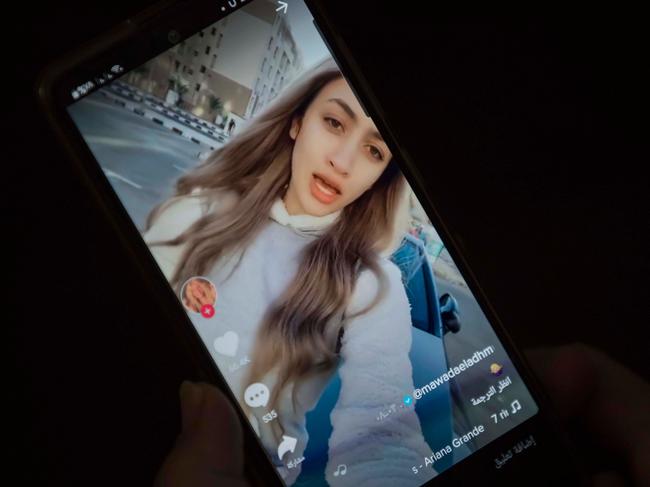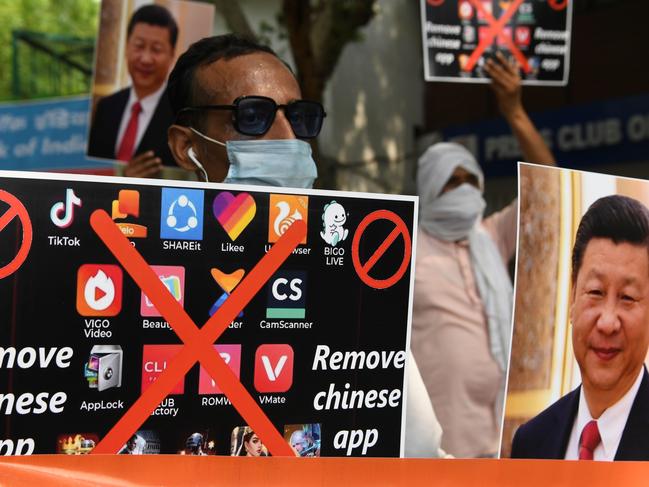TikTok ban by US: Apple rules out buying app and what Donald Trump’s ultimatum means for users in Australia and the world
Apple has denied an interest in buying TikTok as Microsoft has one month to save the social media platform from bans in countries including Australia after Donald Trump gave the Chinese-run app an ultimatum.
Microsoft
Don't miss out on the headlines from Microsoft. Followed categories will be added to My News.
Apple has reportedly hosed down reports it was interested in buying the embattled social network, TikTok, despite reports in the US the tech giant was considering a deal.
An Axios report that named the company as a potential buyer for the TikTok but US tech site The Verge reported that Apple has no plans to pursue such a deal.
On Sunday, Microsoft announced that it was in talks to buy TikTok’s operations in the US, Canada, Australia, and New Zealand, as guided by US President Donald Trump.
The American software giant would have one month to save TikTok from bans in several countries including Australia after the US Government set an ultimatum for the Chinese social network.
Microsoft must do a deal to buy at least part of the company by September 15 to stop TikTok being banned in the United States, as it is in India.
And a Microsoft deal could save TikTok in Australia too, as the company is seeking to purchase its operations in the US, Australia, Canada, and New Zealand.
The popular video-sharing network, used by more than 1.6 million Australians and owned by Beijing-based ByteDance, has attracted international scrutiny due to its censorship, privacy flaws, and controversial Chinese laws around data collection.
An Australian Senate committee has called its executives to appear at a public hearing into foreign interference in social media later this month, after an unnamed federal MP has called for the platform to be banned.
US President Donald Trump doubled-down on his threat to ban the short-video service in America overnight, while giving its owners a small window to do a deal with Microsoft.
Citing security concerns over TikTok’s Chinese ownership, he also said the US Treasury should take “a big percentage” of its sale price.
“We want no security problems with China. It’s got to be an American company, it’s got to be American security, it’s got to be owned here,” Mr Trump said at the White House.
“We don’t want any problems with security.”
Microsoft is one of several companies Mr Trump said were in negotiations to buy the popular app and is understood to be the frontrunner.
“There’s a lot of excitement not only by Microsoft but by other companies in terms of buying it, so we will see what happens,” he said.
“But we want and we think we deserve to have a big percentage of that price coming to America, coming to the Treasury. It would come from the sale. Which nobody else would be thinking about but me.”
In a statement, Microsoft appeared willing to submit to Mr Trump’s demands.
“Microsoft fully appreciates the importance of addressing the President’s concerns,” the statement said.
“It is committed to acquiring TikTok, subject to a complete security review and providing proper economic benefits to the United States, including the United States Treasury.”
The company, whose chief executive Satya Nadella met with Mr Trump about the deal, said TikTok users would have their videos and data stored in the US after a deal, including information currently stored on servers outside the country.
Burgeoning video stars, including TikTok’s 49 users with more than 20 million followers each, would not notice big changes to its operation if the deal went ahead, the company said.
“This new structure would build on the experience TikTok users currently love, while adding world-class security, privacy, and digital safety protections,” it said.
“The operating model for the service would be built to ensure transparency to users as well as appropriate security oversight by governments in these countries.”
If successful, Microsoft’s purchase could give the company more influence in the youth market. Other acquisitions by the Seattle firm include social network LinkedIn, communications network Skype, and the mobile and services division of Nokia.
But what could the fallout be like? This is what you need to know about the ticking clock of regulation against TikTok.
Why would the US Government ban TikTok?
US President Donald Trump has cited national security fears about the video-sharing platform, at least in part because the company behind it, ByteDance, is based in Beijing, China.
Under the 2017 Chinese National Intelligence Law, Chinese organisations and citizens are obligated to provide intelligence for government officials who ask for it.
TikTok has rejected these concerns, with Australian general manager Lee Hunter sending a letter to Australian MPs stating that “contrary to some claims, we are not aligned with any government, political party or ideology”.
What security risk does it pose?
Labor Senator Jenny McAllister, who heads the ongoing Senate inquiry into Foreign Interference through Social Media, says there are “credible reports that TikTok takes more data than its users would expect”.
A US lawsuit against the company, filed in December by a college student, claimed TikTok “vacuumed up and transferred to servers in China vast quantities of private and personally identifiable user data,” including draft videos not published on the platform.
The company has since clarified that it stores data on servers in the US and Singapore.
The TikTok app overtly asks for users’ phone numbers, email addresses, contacts, locations, and access to their camera, microphone and files stored on their devices.
Is there any proof of questionable behaviour from TikTok?
TikTok has engaged in censorship, removing posts discussing the 1989 massacre in Tiananmen Square and protests in Hong Kong, for example.
Internal documents obtained by The Intercept also showed moderators were instructed to censor political speech, videos that could harm “national honour,” and poverty.
TikTok also pulled out of Hong Kong earlier this month following the introduction of a national security law allowing police to request data from internet companies without a warrant.
And users of Apple’s latest beta software, iOS 14, discovered TikTok was copying information on a phone’s clipboard, including text and pictures.
In response, a spokesperson for TikTok said it had updated its app to remove this flaw and denied the company had censored content at the request of China.
“TikTok does not remove content based on sensitivities related to China or other governments,” the spokesperson said. “We have never removed content at the request of the Chinese government and we would not do so if asked.”

What will it mean if TikTok is sold to Microsoft?
A partial or full takeover by Microsoft could prevent TikTok from being banned in several countries, including Australia.
Microsoft is reportedly in talks to buy the social network’s operations in the US, Australia, Canada and New Zealand.
The software giant has until September 15 to complete the deal, according to a timeline set by Trump overnight.
Microsoft could also benefit greatly from buying the ready-made and highly popular video-sharing platform, adding it to acquisitions including the professional social network LinkedIn and communications platform Skype.
Will other countries ban TikTok too?
There is a chance that Australia will ban access to the app.
An unnamed Federal MP told the Herald Sun the video-sharing platform should be restricted in Australia for harvest information from users and storing it on Chinese servers.
The matter is currently one of several matters being investigated by a Senate inquiry, with representatives from the company invited to participate in an upcoming public hearing.
India has already removed TikTok from app stores in its country as one of 59 apps, mostly from China, that were deemed to present a security risk.
How would a ban work?
It’s not yet clear how a US ban would affect everyday TikTok users.
In India, the TikTok app has been removed from Google and Apple app stores but those who installed the app before the ban can still use it.
In Hong Kong, where TikTok pulled out, the app not only vanished from app stores but the company actively blocked Hong Kong phone numbers from registering with the platform.
Another option is that the US Committee on Foreign Investment could order ByteDance to divest from TikTok’s American operations.

How many people use the platform?
TikTok is hugely popular, counting more than 800 million daily active users on its platform and more than two billion downloads for its app.
Roy Morgan estimates that more than 1.6 million Australians were using TikTok by February this year, two thirds of whom were women or girls.
Only YouTube is more popular with Generational Alpha Aussies.
In the US, the TikTok app has been downloaded more than 175 million times and its biggest user group is aged between 10 and 19 years.
What would a ban mean for TikTok influencers?
TikTok is host to 49 users with more than 20 million followers each, according to Social Blade.
Thirty-two of the most popular TikTokkers are from the United States, including dancer Charli D’Amelio, the most followed person on the platform, with 74 million followers.
A ban on TikTok could significantly dent influencers’ fanbases and income they receive from their high profiles. D’Amelio reportedly commands $US25,000 per video.
Will there be an uprising if TikTok is banned in the US?
American TikTok fans are already concerned about the possibility of a ban and taking action.
After Secretary of State Mike Pompeo raised the issue in early July, TikTok users retaliated by posting negative reviews on President Trump’s 2020 campaign app, according to Sensor Tower.
Are there alternative apps to TikTok?
Before TikTok, there was Vine.
After a TikTok ban, if it does come to that, there will be other services focused on sharing short videos.
There is the Facebook-owned Instagram, of course, but closer alternatives include the German-owned Dubsmash for 10-second videos, Byte, from the creators of Vine, for six-second videos, and Triller, which focuses on users dancing or lip-synching to music.
Originally published as TikTok ban by US: Apple rules out buying app and what Donald Trump’s ultimatum means for users in Australia and the world
